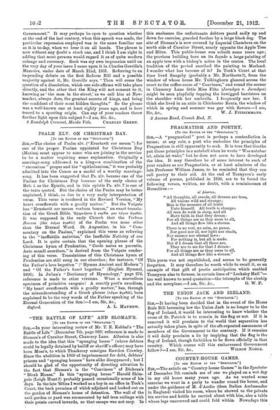PRAGMATISM AND POETRY.
[To THE EDITOR OF 'THE " SPECIATOIL'l SIR,—A "pragmatical" poet is perhaps a contradiction in terms; at any rate, a poet who embodies the principles of Pragmatism is still apparently to seek. It is true that Goethe put those principles in a nutshell when he wrote " Was nutzbar ist, allein ist wabr," but he does not seem to have developed the idea. It may therefore be of some interest to such of your readers as are Pragmatists, or at least admirers of the late Professor William James, to be reminded that they can call poetry to their aid. At the end of Tennyson's early volume of poems, published in 1830, are to be found the following verses, written, no doubt, with a reminiscence of Heraclitus
ol IS‘orres.
"All thoughts, all creeds, all dreams are true, All visions wild and strange ; Man is the measure of all truth Unto himself. All truth is change: All men do walk in sleep, and all Have faith in that they dream: For all things are as they seem to all, And all things flow like a stream.
There is no rest, no calm, no pause, Nor good nor ill, nor light nor shade, Nor essence nor eternal laws :
For nothing is, but all is made. But if I dream that all these are, They are to me for that I dream: For all things are as they seem to all, And all things flow like a stream."
This poem was not republished, and seems to be generally forgotten. It may therefore be worth while to recall it, as an example of that gift of poetic anticipation which enabled Tennyson also to foresee, in certain lines of "Locksley Hall "- too well known to need quotation—the triumphs of the airship and the aeroplane.—I am, Sir, &c., G. W. P.










































 Previous page
Previous page